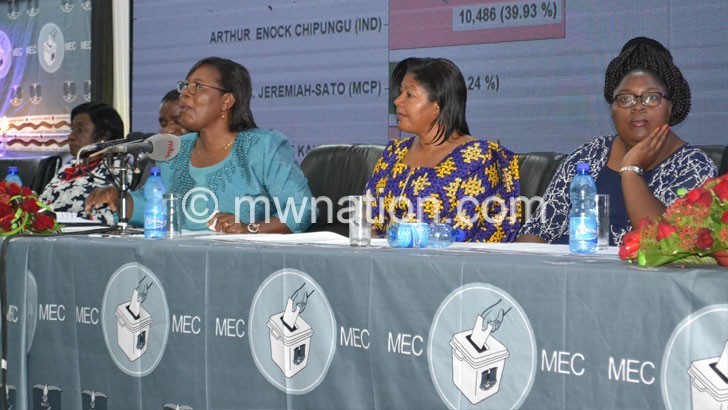Councils face shift of power
When local government councils are constituted after the new cohort of councillors is sworn in, three political parties are poised to lead cities and municipalities if the number of wards won is anything to go by.
Based on the number of wards won, the governing Democratic Progressive Party (DPP) could have mayors in Blantyre and Zomba cities as well as Luchenza Municipality in Thyolo while UTM Party could produce one in Mzuzu City Council.
In Lilongwe City and Kasungu Municipality, Malawi Congress Party (MCP) is standing a better chance of having mayors affiliated to the party.

Official results of the Local Government Elections (LGE) announced by Malawi Electoral Commission (MEC) chairperson Jane Ansah on Tuesday evening show that in Blantyre City Council, DPP has numerical advantage with 16 wards out of 24. The remaining eight wards are shared equally by UTM Party and independents.
In Zomba City, DPP has six wards out of 10 while UTM, People’s Party (PP), United Democratic Front (UDF) and have one each. The tenth councillor is an independent.
In Luchenza Municipality, DPP and independents have won four wards each.
On the other hand, in Lilongwe City Council, MCP swept 21 of the 23 wards with the remaining two won by UTM councillors.
In Mzuzu City Council, UTM is the dominant party with eight of the 15 wards. MCP won four wards, Alliance for Democracy (Aford) two and independents two.
Reacting to the outcome and possibility of dominant parties leading the country’s 35 local government councils, governance analyst Henry Chingaipe in a telephone interview said it was highly likely that parties with more numbers will claim the leadership of respective councils.
He said: “In my view, it should not be a departure from the norm where for the first half of the term parties in control would take leadership of councils.
“However, mayors and chairpersons [of councils] in Malawi are just ceremonial and do not possess powers as it ought to be. Central government, through the responsible ministry, still pulls strings.”
In a separate interview, Happy Kayuni, a professor in the Department Political and Administrative Studies Department at the University of Malawi’s Chancellor College, said the dominance of different parties in councils was a good development.
He said: “Diversity in leadership means that democracy is at work. Besides, we expect that each council will implement policies independently.
“We know that there is going to be a tussle between the party in government and leadership of councils in opposition dominated jurisdictions.”
The election results show that DPP and MCP have collectively claimed 321 wards out of a total of 460. Results from Ngokwe Ward in Machinga South East Constituency and Mkumbiza Ward in Mulanje Bale Constituency have been withheld pending resolution of alleged irregularities.
DPP leads the pack with 161 ward councillors followed by MCP with 160 and independents come a distant third with 74. UTM Party won 39 wards, UDF secured 20, PP four wards and Aford two.
From a gender perspective, the LGE results have shown that the country is still struggling to register progress in achieving 50:50 representations in elected positions with 59 women winning out of 460 wards.
Reacting to the situation, gender activist Emma Kaliya, in a telephone interview yesterday, described the results from this year’s elections as “disturbing”.
She said: “If we compare the numbers in the 2014 Local Government Elections where we managed 56 women [about 12.2 percent]
, you will find that there have been a lot of efforts but slow progress.
“We seem to be moving in circles. The major problem is that the country’s legal framework is not conducive to the fulfilment of 50:50 goals. We need more than economic empowerment to register meaningful progress.”
Kaliya suggested the introduction of deliberate policies, including quotas for women seats both in parliamentary and LGE.
She also revived the debate on proposals for exclusively women constituencies in each of the 28 districts to bolster women representation.
From the results, MCP recorded the highest number of triumphant women candidates at 23 followed by DPP with 18 while UTM and independents got seven women each and UDF four.
Out of the 35 councils, 25 secured women representation while 10 failed to vote for a woman. Blantyre tops the list of women representatives with nine followed by Lilongwe’s seven.
Mangochi District Council will have five female councillors, Luchenza Municipality and Salima District Council three each.
In his reaction, 50-50 Campaign Management Agency media consultant Wisdom Chimgwede said there were signs that the country can do well although he said the odds were high up against women.
In a written response, he said: “We still have a long way to go indeed. Most stakeholders do not put much effort at local government elections level. There is a lot of focus on parliamentary and presidential elections.”
The Royal Norwegian Embassy, in collaboration with the Ministry of Gender, Children, Disability and Social Welfare as a way of increasing the representation of women in public offices, has been providing funds through a consortium comprising the Centre for Civil Society Strengthening (CCSS) and Action Aid Malawi to manage the 50-50 programme to increase women political participation. The project started in 2017 and ends this year.





